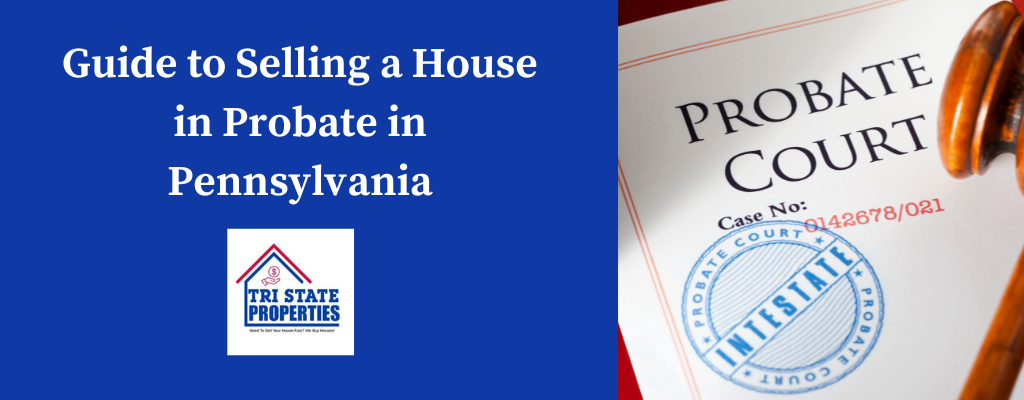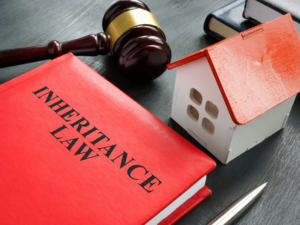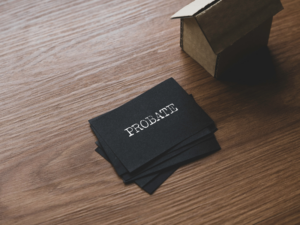
TABLE OF CONTENTS
- What Is Probate Property In Pennsylvania?
- How Does A Probate Sale Work In Pennsylvania?
- What Are The Steps Of Selling A House In Probate?
- How Do You Sell an Inherited Home Quickly in Pennsylvania?
- What Are The Legal Requirements For Selling A House In Probate In Pennsylvania?
- How Long Does It Take To Sell A House During Probate In Pennsylvania?
- Who Is Responsible For Repairs On A Probate Property In Pennsylvania?
- Can A Spouse Inherit The Property After Death In Pennsylvania?
- How Do You Handle Medical Assistance When Selling A Deceased Estate In Pennsylvania?
- What Are The Financial Considerations When Selling An Inherited House In Pennsylvania?
- What Are the Pros and Cons of Selling an Inherited House Through Real Estate Agents Vs. Selling Directly to Buyers in Pa?
- What Are The Benefits Of A Cash Offer For An Inherited Home In PA?
- Are There Tax Implications When Selling A Deceased Estate in Pennsylvania?
- Do You Have To Pay Capital Gains Tax On An Inherited Home In PA?
- Should I Use My Own Attorney Or Hire One When Selling A Deceased Estate In Pa?
- How Can I Make The Process Of Selling An Inherited Home Easier In PA?
- Is There an Inheritance Tax When Selling A House In PA?
- Do All Heirs Have To Agree To Sell Property In Pennsylvania?
- Can You Live In A House During Probate In PA?
- How Long Does An Executor Have To Sell A House In PA?
What Is Probate Property In Pennsylvania?
In Pennsylvania, probate property is any real estate or personal property owned by a deceased person. This includes bank accounts, stocks, investments, real estate holdings, and vehicles.
The court must appoint the executor or administrator of the estate to sell these types of assets in Pennsylvania probate. The executor or administration must make sure that all debts the deceased owes are paid off before any remaining assets are distributed among beneficiaries.
Suppose you want to sell a probate home. In that case, the executor must obtain a grant administration from the court and hire an agent to help market and sell the property. Whenever both parties accept the offer, they must abide by the terms outlined in the sale agreement and any other applicable state laws related to probate.
How Does A Probate Sale Work In Pennsylvania?

A probate sale in Pennsylvania requires the estate executor to obtain a court order that authorizes them to sell the deceased’s real estate. The executor must advertise the property for sale.
Interested buyers will submit offers in writing, which are then checked against the will and other documents related to the estate. If all is in order, then a purchase agreement is drafted with acceptable terms and conditions for both parties.
Some estates require an appraisal of the property as part of the process. The executor must also prepare a settlement statement showing how all proceeds from the sale will be distributed under state laws and any special instructions within the will.
Once the court approves, closing can take place, and funds can be dispersed accordingly.
What Are The Steps Of Selling A House In Probate?
Several important steps must be taken when selling a house in a probate in Pennsylvania. Firstly, obtaining the documentation and authorization required to proceed with the sale is important.
This includes obtaining Letters of Administration from the Orphan’s Court or a court order if the Executor is not appointed by will. Additionally, all potential buyers should be thoroughly vetted and allowed to view the property before making an offer.
After a purchase agreement has been reached, it is also necessary to obtain court approval to confirm that all parties involved are properly represented and that all terms of the sale are fair and equitable. Once approved, completing all necessary paperwork and submitting it to the county recorder’s office is important, as it will become part of the public record.
Finally, ensure that any proceeds from the sale are distributed according to instructions provided in the will or as otherwise ordered by a court. Following these steps can help ensure a successful sale of a house in probate in Pennsylvania.
How Do You Sell an Inherited Home Quickly in Pennsylvania?

The process can be complex and time-consuming when selling an inherited home in Pennsylvania. It is important to understand the probate laws and regulations of the state before beginning the process.
Hiring a real estate attorney is key to helping navigate through Pennsylvania’s probate laws and procedures. An experienced realtor can greatly assist in helping market the home for sale and guide you through each step of the process, including pricing, marketing, negotiations, contracts and closing.
Additionally, it is important to understand how taxes are affected by selling an inherited home so that proper tax filings are made. Preparing the house for sale by making necessary repairs or upgrades can help attract buyers and make a successful sale more likely.
Setting a realistic price for an inherited home is also essential for a quick sale. Utilizing online resources such as listing websites to showcase the property can help increase its visibility, giving it greater exposure to potential buyers.
Being proactive during each process step will greatly increase your chances for a successful sale of your inherited home in Pennsylvania.
What Are The Legal Requirements For Selling A House In Probate In Pennsylvania?
It is important to understand the legal requirements for selling a house in probate in Pennsylvania. Probate is the court-supervised process of administering a deceased person’s estate.
Before selling a house in probate, the estate executor must obtain Letters Testamentary from the Orphans’ Court Division of the Court of Common Pleas. This document provides proof that an executor has been appointed and authorized to act on behalf of the estate.
The executor must submit an inventory form to the court listing all property owned by the deceased at the time of death, including real estate. In addition, documents such as deeds or mortgage records must be filed with the court before any sale of real estate.
The last thing to do when selling a house in PA, an executor must obtain court approval for any transaction related to property owned by the deceased. Whenever court approves all documents required and submits them for recordation a sale can be done.
How Long Does It Take To Sell A House During Probate In Pennsylvania?

Selling a house in probate in Pennsylvania can be complex and time-consuming, and understanding how long the process may take is important. The amount of time it takes to sell a house during probate will depend on several factors, including the complexity of the deceased’s estate, the number of heirs involved, and whether or not there is a dispute among them.
Before proceeding with the sale of an inherited property, executors should become familiar with Pennsylvania laws regarding probate and estate planning. After filing the necessary paperwork with the court to obtain legal authority to proceed with the sale, it is important to ensure that all heirs know that you intend to sell the house.
This can often take several months or longer if multiple parties are involved. Marketing efforts can begin once all issues have been addressed and approved by the court.
Sometimes, it may take a few weeks or months for offers from potential buyers to come in; however, this timeline may vary depending on market conditions and property type. Ultimately, selling a house in probate requires patience and an understanding of local laws and regulations—something an experienced real estate professional can assist with.
Who Is Responsible For Repairs On A Probate Property In Pennsylvania?
When selling a house in probate in Pennsylvania, the responsibility for repairs lies with the executor or administrator of the estate. This is due to their role in settling any outstanding debts, managing the sale of assets, and distributing inheritance to beneficiaries.
According to Pennsylvania probate law, all parties involved must provide an accounting for any repairs on the property before its sale. The executor or administrator ensures necessary repairs are made and documented before listing the property for sale.
It’s also important for them to be aware of any local ordinances requiring certain repairs before a house can be put on the market. Depending on how much time has passed since the owner’s death, significant maintenance and repair needs could be addressed before a successful sale can occur.
Being proactive about making necessary repairs will help ensure a smoother transaction when it comes time to complete the sale of a probate property in Pennsylvania.
Can A Spouse Inherit The Property After Death In Pennsylvania?

In Pennsylvania, a surviving spouse has the right to inherit a property in probate after the death of their partner. This is only sometimes the case for other heirs in the will.
Generally, a surviving spouse is first in line to inherit the deceased’s property, regardless of what was stated in the will. If there are multiple surviving spouses, they need to agree on how to divide up the assets.
If there are no hears named in the will or don’t wish to claim any of the assets, the surviving spouse will become the sole owner of all assets and have complete control if there are no hears named in the will.
This process takes time to happen. You must take different steps to ensure that all requirements are met and that all parties involved are adequately informed.
How Do You Handle Medical Assistance When Selling A Deceased Estate In Pennsylvania?
When selling a deceased estate in Pennsylvania, it is important to understand the requirements for medical assistance when dealing with probate. In Pennsylvania, the Office of Medical Assistance Programs (OMAP) administers Medical Assistance (MA), a publicly funded health insurance program that helps those eligible access medical care.
MA is available to individuals and their families if their income and resources meet certain eligibility requirements. Therefore, if the decedent received MA before passing away, it is important to review their estate planning documents to determine if their estate will be responsible for paying back benefits received by the decedent before death.
When selling a house in probate, you may be required to pay back any MA benefits received during the deceased’s lifetime. Additionally, if some heirs or beneficiaries are receiving MA, you may also need to provide proof of income and assets for them as well.
When selling a house, it is important to consult an attorney who specializes in probate law in Pennsylvania to ensure that all requirements regarding MA are met correctly.
What Are The Financial Considerations When Selling An Inherited House In Pennsylvania?

When selling a house inherited through probate in Pennsylvania, it is important to consider the financial implications. Understanding the various taxes and fees that may apply to selling an inherited home is also important.
These can include inheritance tax, transfer tax, estate tax, capital gains tax, and other such taxes. Additionally, depending on how long you have held onto the property, additional costs may be associated with necessary repairs or improvements to bring the property up to market value.
It may also be necessary to pay off any outstanding mortgages or other liens still attached to the property. In some cases, legal costs must also be considered if any beneficiaries contest the sale of the property.
Sellers of an inherited home in Pennsylvania need to take all these financial considerations into account before deciding whether or not selling is their best option.
What Are the Pros and Cons of Selling an Inherited House Through Real Estate Agents Vs. Selling Directly to Buyers in Pa?
Selling an inherited house in probate in Pennsylvania can be daunting. One must comprehend the pros and cons of selling a house through an agent or directly to buyers.
Real estate agents have knowledge of market trends and pricing that can be beneficial when setting the price for the home. Additionally, agents typically have access to wider networks of potential buyers who may otherwise not be aware of the property.
If using a realtor, the seller must pay commissions and fees for using a real estate agent’s service. However, selling an inherited house directly to buyers may mean foregoing some professional assistance. However, you can still achieve higher profit margins since there’s less money for services and fees.
Suppose you opt to sell to direct buyers. In that case, you will need to take on more responsibility for advertising, scheduling viewings, conducting negotiations, and following all legal processes related to transferring ownership. Owners must know this information to make the best decision when selling their inherited home in Pennsylvania.
Conversely, what if we can say that selling to a real estate investor can give you a better way since the selling process is quicker and smoother? You can sell in any condition or situation and close in your schedule. If you want to know more about us, you can contact us Tri State Properties (267) 703-9956 or fill out our short form. We would love to help you!
What Are The Benefits Of A Cash Offer For An Inherited Home In PA?

Selling a house in Pennsylvania can be difficult and time-consuming, but the potential benefits of taking a cash offer can help make the process simpler. Cash buyers are more likely to complete the transaction quickly as they have their funds ready and available for purchase, meaning there is no need for bank financing or any other institution.
Cash buyers don’t require costly repairs or upgrades before buying a property. This means that you won’t have to deal with property updates or spending money on repairs. You just need to take what you want and leave the rest. Forget about traditional methods. Cash offers are made without financing contingencies. Once an offer is accepted, it will go through quickly and with no delays.
When you sell an inherited property in PA for cash, you may avoid paying certain taxes or fees that come with another sale process. There are many benefits and advantages when selling an inherited house for cash in Pennsylvania.
Check out how our process works; No need to deal with repairs or pay costly renovations or fees. With Tri State Properties, you can have peace of mind when selling your house in probate.
Are There Tax Implications When Selling A Deceased Estate in Pennsylvania?
When selling a deceased estate in Pennsylvania, it is important to understand the potential tax implications of the sale. In Pennsylvania, the estate executor will be responsible for filing all relevant taxes due from the property sale.
The taxes associated with a probate sale can include income taxes, capital gains taxes and inheritance taxes. Income taxes are based on any profit from the sale of the house, while capital gains taxes are levied on any profits earned when selling an appreciated asset such as real estate.
Inheritance taxes are also imposed on beneficiaries who receive assets from an estate or trust. Before proceeding with a probate sale, it’s important to consult with a qualified accountant or tax lawyer to ensure that all taxes are paid in full and that any potential deductions or credits are considered.
Knowing the financial implications of a probate sale ahead of time can help you successfully navigate through this process and ensure that all due payments to state and federal authorities are fulfilled.
Do You Have To Pay Capital Gains Tax On An Inherited Home In PA?

Selling a house in probate in Pennsylvania can be complicated, so it is important to understand the tax implications involved. If you are inheriting a home in PA, you may wonder if you must pay capital gains tax on the property.
Not always straightforward, depending on several factors such as the size of the estate and whether or not the dependent was a state resident at the time of death. Typically if the state is valued over $2M, then federal estate taxes will be due on any assets that pass through probate including real estate.
However, if the estate is valued under this amount, any inherited property would usually not be subject to capital gains tax. In addition, there may also be specific exemptions for family members such as surviving spouses or minor children that could reduce or eliminate capital gains taxes on an inherited home in PA.
Like any other financial matter, it’s recommended that you consult with a qualified accountant or financial advisor before making any decision regarding selling a house in probate in Pennsylvania.
Should I Use My Own Attorney Or Hire One When Selling A Deceased Estate In Pa?
Some people wonder if hiring an attorney is necessary if you are selling a deceased estate in Pennsylvania. While it is tempting to save money by not hiring an attorney, using one specializing in probate and estate law can have benefits.
An experienced attorney will know all the necessary paperwork and regulations and the best strategies for selling your house quickly and for the highest possible price. An attorney can also ensure that all complicated issues are handled correctly and without risks of additional costs due to mistakes or delays.
It’s a well-worth investment since they can provide helpful advice taking care of the entire process from start to finish, including setting a fair asking price, negotiating with buyers, and closing the sale.
How Can I Make The Process Of Selling An Inherited Home Easier In PA?

When selling a house in probate, you can take steps to make it smoother and easier. Knowing the local laws is essential since they vary from state to state.
In Pennsylvania, if the will of the deceased is filed with the Register of Wills, then probate is not required, and the estate executor can sell the property without court approval. However, probate court proceedings may be necessary if a will is not provided or contested.
You must consult an attorney specializing in state law to ensure that you meet all legal requirements and complete all paperwork correctly.
Having an experienced agent on your side can help you navigate the process efficiently.
It’s beneficial to use companies and other home services, such as appraiser and inspectors when selling an inherited home in PA. With these steps taken before listing your house for sale, you’ll increase your chances of success and minimize any challenges you may face.
Is There an Inheritance Tax When Selling A House In PA?
When selling a house in Probate in Pennsylvania, one of the important factors to consider is whether any inheritance taxes are associated with the sale. Generally speaking, there are two types of inheritance taxes in Pennsylvania: a tax on transfers from a decedent to a beneficiary and an inheritance tax on distributions made to estates.
The first type of tax applies when transferring assets from the deceased’s estate to a beneficiary (or heirs). This is known as “transfer inheritance tax” and must be paid by the estate before the distribution of assets can occur.
The second type, an “inheritance tax,” applies when distributions are made from an estate to another person or entity. This type of tax is based on the amount distributed and must be paid before the recipient can receive any money.
It is important to note that both types of taxes may apply depending on how the property is transferred and who receives it. In addition, there may also be additional fees or taxes due at closing, so sellers need to understand all their obligations before proceeding with a sale in probate.
Do All Heirs Have To Agree To Sell Property In Pennsylvania?
If you are selling a house in Pennsylvania it is important to understand that all heirs must agree before the sale can go through. All estate beneficiaries must sign off on any agreement or contract related to selling a property.
If one heir does not agree or cannot be located, the sale may only be completed once all parties have agreed and signed. In cases where an heir cannot be located, the court may require additional steps, such as publishing a notice in a local newspaper to allow them to come forward.
This process can take several months and should be considered when agreeing to sell a house in probate in Pennsylvania.
Can You Live In A House During Probate In PA?
Yes, you can live in a house during probate in Pennsylvania. Although the process of selling a house in probate can be complex, understanding the steps and following the advice of an experienced real estate professional is key to successfully selling a home while it is in probate.
In Pennsylvania, heirs must file paperwork with the county court clerk’s office to open a probate proceeding. Depending on the complexity of the estate, this process can take several months or even years to complete.
Before listing your property for sale, ensure all necessary documents have been filed and approved by the court. Additionally, seek guidance from an experienced real estate agent who understands how to navigate the probate process and will help ensure your house is marketed correctly and sells quickly at its highest price. Proper preparation and guidance make it possible to sell a home in probate in Pennsylvania successfully.
How Long Does An Executor Have To Sell A House In PA?
The executor of an estate in Pennsylvania has six months from the date the will is admitted to probate to sell any real property owned by the deceased. The executor must contact the court to request permission to sell the home and provide evidence that selling the real estate is necessary for settling the estate.
While the executor can attempt a sale independently, seeking legal advice or engaging a real estate professional with experience in probate sales may be beneficial. If multiple heirs are involved, all parties must agree to any sale of real estate, or they may have grounds for contesting the sale.
Before attempting to sell a house in probate, an executor must understand all their rights and responsibilities under Pennsylvania law.
At Tri State Properties, we buy your house regardless of its condition or situation. If you have any questions, contact us at (267) 703-9956 or complete our form. You can also review our clients’ testimonials to see their selling experiences!
![companies that buy houses [market_city]](https://cdn.carrot.com/uploads/sites/68538/2023/08/Company-That-Buys-Houses.webp)

